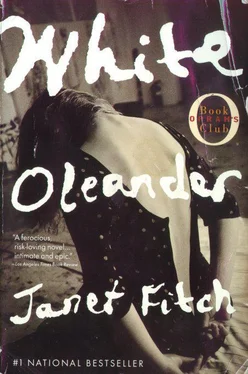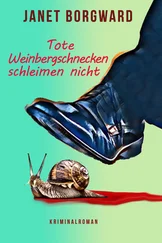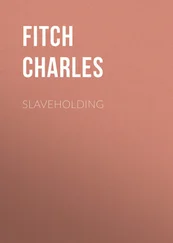Janet Fitch - White Oleander
Здесь есть возможность читать онлайн «Janet Fitch - White Oleander» весь текст электронной книги совершенно бесплатно (целиком полную версию без сокращений). В некоторых случаях можно слушать аудио, скачать через торрент в формате fb2 и присутствует краткое содержание. Жанр: Современная проза, на английском языке. Описание произведения, (предисловие) а так же отзывы посетителей доступны на портале библиотеки ЛибКат.
- Название:White Oleander
- Автор:
- Жанр:
- Год:неизвестен
- ISBN:нет данных
- Рейтинг книги:3 / 5. Голосов: 1
-
Избранное:Добавить в избранное
- Отзывы:
-
Ваша оценка:
- 60
- 1
- 2
- 3
- 4
- 5
White Oleander: краткое содержание, описание и аннотация
Предлагаем к чтению аннотацию, описание, краткое содержание или предисловие (зависит от того, что написал сам автор книги «White Oleander»). Если вы не нашли необходимую информацию о книге — напишите в комментариях, мы постараемся отыскать её.
White Oleander — читать онлайн бесплатно полную книгу (весь текст) целиком
Ниже представлен текст книги, разбитый по страницам. Система сохранения места последней прочитанной страницы, позволяет с удобством читать онлайн бесплатно книгу «White Oleander», без необходимости каждый раз заново искать на чём Вы остановились. Поставьте закладку, и сможете в любой момент перейти на страницу, на которой закончили чтение.
Интервал:
Закладка:
I wondered what had happened in Argentina, if it was so great there, what was she doing here in Hollywood? What had happened to her husband, and her little boy? I was about to ask when she turned the page and pointed a lacquered nail at a picture of two girls in tan uniforms kneeling on a lawn. “My maids,” she said, smiling nostalgically. “They were sitting around on their fat culos, so I made them pull weeds out of the lawn.”
She gazed admiringly at the picture of the girls pulling weeds. It gave me the creeps. It was one thing to have somebody pull weeds, but why would anybody take a picture of it? I decided I was better off not knowing.
AT AMELIA’S, my room was large, two beds covered in white flower-sprinkled quilts, and a view into the deodar cedar. My roommate, Silvana, was an older girl, eyebrows plucked to a thin line, lips outlined in lip liner but not filled in. She lay on the bed farther from the door, filing her nails and watching me as I put my things away in the dresser, my boxes in the walk-in closet.
“Last place I slept was a laundry porch,” I said. “This is nice.”
“It’s not what you think,” Silvana said. “And don’t think sucking up to that bitch is going to do you any good. You better side with us.”
“She seems okay,” I said.
Silvana laughed. “Stick around, muchacha.”
In the morning I waited my turn to use the huge, white-tiled bathroom, then dressed and went downstairs. The girls were already leaving for school. “Did I miss breakfast?” I asked.
Silvana didn’t answer, just shouldered her backpack, her eyebrows two indifferent arches. A horn honked, and she ran outside, got into a low-slung purple pickup truck and drove away.
“You like breakfast?” Nidia said, putting on her baseball jacket in the front hall. “It’s in the fridge. We saved it for you.”
Una and Kiki Torrez laughed.
I walked back to the kitchen. The refrigerator was padlocked.
When I went out into the hall again, they were still standing there. “Was it good?” Nidia asked. Her eyes glittered under her moon-scar like a hawk’s, amber-centered.
“Where’s the key?” I asked.
Kiki Torrez, a petite girl with long glossy hair, laughed out loud. “With our lady of the keys. Your friend, the noblewoman.”
“She’s at work now,” said Lina, a tiny Central American with a broad Mayan face. “She’ll be home by six.”
“Adios, Blondie,” Nidia said, holding the door open for them all to go out.
IT DIDN’T TAKE ME long to figure out why the girls called Amelia Cruella De Vil. In the beautiful wooden house, we went hungry all the time. On the weekends, when Amelia was home, we got fed, but during the week, we only had dinner. She kept a lock on the refrigerator, and had the phone and the TV in her room. You had to ask permission to use the phone. Her son, Cesar, lived in a room over the garage. He had AIDS and smoked pot all day. He felt sorry for us, knew how hungry we were, but on the other hand, he didn’t pay rent, so he felt there was nothing he could do.
I sat in my tenth-grade health class at Hollywood High with a searing headache. I couldn’t tell you whether we were studying VD or TB. Words buzzed like flies that would not land, words drifted across the pages of my book like columns of ants. All I could think of was the macaroni and cheese I would make that night for dinner, how I would devour as much of the cheese as I could without getting caught.
While I made the white sauce for the macaroni and cheese, I hid a stick of margarine behind a stack of plates. The girls told me right off that whoever had kitchen duty stole food for everybody, and if I didn’t, they could make life hell for me. After the dishes, I carried it up to my room inside my shirt. Once we could hear Amelia in her room talking on the phone to a friend, they all came into our room and we ate the whole stick. I divided it into cubes with my knife. We ate it slowly, licking it, like candy. I could feel the calories enter my bloodstream, undiluted, making me high.
“Eighteen and out,” Nidia said as she licked her fingers. “If I don’t kill that bitch first.”
But Amelia liked me. She had me sit next to her and finish the food on her plate when she was done eating. If I was really lucky, she invited me into the sitting room after dinner to talk about decorating, look at her fabric swatches and wallpaper patterns. I nodded to her endless anecdotes about aristocratic Argentina while scarfing down tea and butter cookies. The girls resented my collaborating with the enemy, and I didn’t blame them. They didn’t speak to me at school or on the street in the long hungry lockout afternoons before she got home. Nobody had a key—we might steal something, break into her room, use the phone.
WHAT CAN I tell you about that time in my life? Hunger dominated every moment, hunger and its silent twin, the constant urge to sleep. School passed in a dream. I couldn’t think. Logic fled, and memory drained away like motor oil. My stomach ached, my period stopped. I rose above the sidewalks, I was smoke. The rains came and I was sick and after school I had nowhere to go.
I drifted the streets of Hollywood. Everywhere were homeless kids, huddled in doorways, asking for dope, change, a cigarette, a kiss. I looked into their faces and saw my own. On Las Palmas, a girl with half her hair shaved started following me, calling me Wendy. “Don’t you walk away from me, Wendy,” she yelled after me. I opened my knife in my pocket, and when she grabbed the back of my jacket, I turned and stuck it under her chin.
“I’m not Wendy,” I said.
Her face was streaked with tears. “Wendy,” she whispered.
Another day I found myself walking west instead of east, then north, zigzagging through wet side streets, drinking the resinous smells of eucalyptus and pittosporum and leftover oranges on the trees. Water squished in my shoes, my face burned with fever. I knew vaguely I should get out of the rain, dry my feet, prevent pneumonia, but I felt a strange pull to go north and west. I picked an orange from somebody’s tree, it was sour as vinegar, but I needed the vitamin C.
It was not until I emerged onto Hollywood Boulevard that I realized where I was going. I stood in front of our old apartment house, dingy white streaked with rain, water dripping from the bananas and the palms and the glossy oleanders. This was where our plane had crashed. I saw our windows, the ones that Barry had broken. Michael’s windows. There was a light on in his apartment.
My heart came to life for a moment, beating with hope as I studied the names by the buzzers, imagining him opening the door, his surprise, he would smell of Johnnie Walker, and the warmth of his apartment, the ceiling crumbling, the piles of Variety, a great movie on the TV, how welcome I’d be. Masaoka, Benoit/Rosnik, P. Henderson. But no McMillan, no Magnussen.
I knew by my disappointment what I had really expected. That we would still be here. That I could go in and find my mother writing a poem, and I could wrap myself in her quilt and this would just be a dream I could tell her about. I was not really a girl one step from homeless, eating scraps off Amelia’s plates. In that apartment, my mother had never met Barry Kolker, and prison was something she’d read about in the papers. I would brush her hair, smelling of violets, and swim again in the hot nights. We would rename the stars.
But we were gone. Michael was gone. The door was locked, and the pool was green with algae, its surface pimpled with rain.
I LEANED AGAINST the wall of the lunch court at Hollywood High, fevered and trying not to watch the other kids eat. A girl looked into her lunch bag, made a face, and threw away the offending meal. I was shocked. Of course, she would have a snack waiting when she got home. I wanted to smack her. Then I remembered The Art of Survival . When your plane crashed, you drank radiator water, you clubbed your sled dogs. This was no time to be fastidious.
Читать дальшеИнтервал:
Закладка:
Похожие книги на «White Oleander»
Представляем Вашему вниманию похожие книги на «White Oleander» списком для выбора. Мы отобрали схожую по названию и смыслу литературу в надежде предоставить читателям больше вариантов отыскать новые, интересные, ещё непрочитанные произведения.
Обсуждение, отзывы о книге «White Oleander» и просто собственные мнения читателей. Оставьте ваши комментарии, напишите, что Вы думаете о произведении, его смысле или главных героях. Укажите что конкретно понравилось, а что нет, и почему Вы так считаете.












